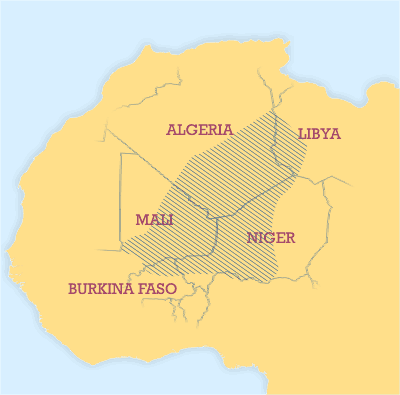Tuareg
The Tuareg are an Islamic people who dwell in and around the SAHARA DESERT. They speak Tamacheq, one of North Africa's Berber languages. Numbering about one million people altogether, Tuareg can be found mainly in MALI and NIGER but also in BURKINA FASO, ALGERIA, and LIBYA.
Descendants of the nomadic BERBERS, North Africa's original inhabitants, the Tuareg appeared first in Libya and spread into regions bordering the Sahara. They incorporated local farming peoples into their society, sometimes trading with their neighbors, sometimes raiding them for slaves. Tuareg culture has several distintive features, including a custom that requires men to veil their faces and a religion that blends traditional beliefs and rituals with Islam.

In the past Tuareg peoples earned a living by breeding livestock, gardening in desert oases, operating trading caravans, running Islamic schools, and practicing metalwork. Agriculture is not easy for the Tuareg for several reasons. In the parts of Mali and Niger where most Tuareg live, the land is primarily made up of flat desert plains, rugged grasslands, and desert borderland. In these areas, some crops can be raised, but only if daily irrigation is used, and repeated droughts have made even basic irrigation a difficult prospect. Livestock and salt, two other staples, have declined in value and further hurt the Tuareg's economic stability. More recently some Tuareg have become migrant laborers, while others have begun making art and craft items for North Africa's tourist trade. Fleeing drought and political unrest in their home countries, many Tuareg have moved south to cities and rural areas in western Africa. In the early 1990s some Tuareg joined an armed revolt against the governments of Mali and Niger. Since rebel and government forces signed an agreement to end the fighting in 1995, movements to revive Tuareg culture have flourished. (See also Islam in Africa.)